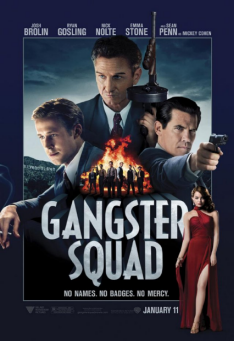Print Edition: January 16, 2013
 The truth and the fictional truth are one in the same in the uneven but watchable mess that is Gangster Squad. Its focus on the authentic look and feel of the late 1940s is the true highlight of the film which is heavy on the style and light on substance.
The truth and the fictional truth are one in the same in the uneven but watchable mess that is Gangster Squad. Its focus on the authentic look and feel of the late 1940s is the true highlight of the film which is heavy on the style and light on substance.
The phrase “inspired by true events” is just another way of saying “this was sort of true but not really.” After seeing a fully dressed police officer throw a knife into a mobster’s hand across a busy dance floor, the truth has certainly been set free. But Gangster Squad isn’t concerning itself with being a factual film. It acknowledges what it is by having bad guys toting dual Thompson machine guns and old timer cops firing revolver pistols Old West style.
The film keeps one entertained with several stylish if that repetitive gun fights and a diverting performance by Sean Penn as Mickey Cohen. His portrayal of the former gangster highly over embellishes Cohen’s actual position in the Los Angeles mob, but it does show how Cohen started up the gambling wire that was connected with Vegas betting rig. The film dips into truth from time to time just to save face with the beginning message stating its partial commitment to the truth.
Ganster Squad’s violence isn’t excessive in terms of brutality but in near parody. Director Ruben Fleischer comedic traits break through the mold and teeter Gangster Squad where it shouldn’t. His lack of experience in the action genre is evident throughout the production. At a point during a major gun battle, Fleisher is apparently trying to make you care about all the Christmas ornaments being shot up in the crossfire. His attention is unfocused and the film suffers both in pacing and development.
His focus on the style and atmosphere, however, is decent as he envelops the viewer in ‘40s Los Angeles. The city lights and architecture are presented in great clarity and setting. The night life is especially displayed in styles of dining, evening wear and attitude. The choices of songs for the soundtrack help build the envelopment of the timeframe as classy jazz tunes are played during the establishing shots and montages.
Gangster Squad’s story is similar to that of The Untouchables. The fight for justice against the mob being taken into the hands of a few rogue cops is straight out of the 1987 Kevin Costner classic. There are moments where Gangster Squad tries to walk the same path as The Untouchables. A long tracking shot through a L.A. night club, the group of cops battling a big bad mob boss all harken back to The Untouchables. But the characters in Gangster Squad are nowhere near as developed as Costner’s crew was. The pacing and introduction of the crew is generic to a typical action movie in which you know who will die and you only remember their one single trait instead of their name. Josh Brolin and Ryan Gosling give decent performances, but both feel as though they are half done. But with the lack of development for their characters in the script, it is hard to blame them. They never get a moment of true elaboration, just knit pieces here and there. Sean Penn turns out to be the most interesting character. He is given a character that already has his traits laid on the table within the first minute and he has fun with it.
Gangster Squad was a troubled spawn right from the start. The change of style for Fleischer proved to be too much for him. In terms of a straight up action film, it delivers. But with such a stellar cast and a world and story it had available, the potential for this film far exceeded what was actually delivered.


